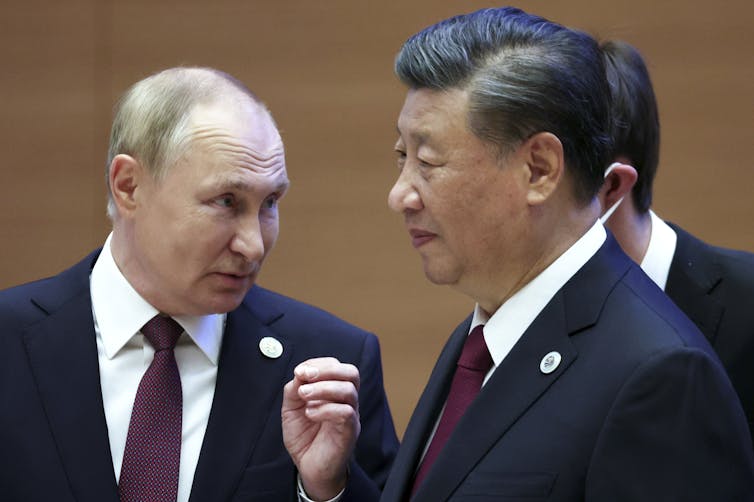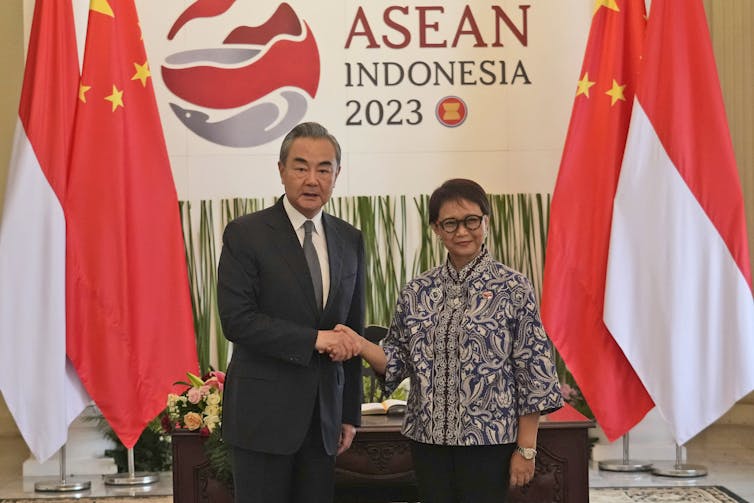World News

Jingdong Yuan, University of Sydney
At last week’s NATO summit, the members issued a final statement criticising China’s coercive policies, which they said challenge the interests, security and values of the bloc.
The NATO members did, however, commit to “constructive engagement” with the rapidly rising superpower.
Beijing reacted strongly to the statement nonetheless. It accused the alliance of “smearing and lying” about China and warned against NATO’s outreach efforts in the Asia-Pacific.
Foreign Ministry spokesperson Wang Wenbin said in blunt terms:
NATO must abandon the outdated Cold War mentality and zero-sum mindset, renounce its blind faith in military might and misguided practice of seeking absolute security, halt the dangerous attempt to destabilise Europe and the Asia-Pacific and stop finding pretext for its continuous expansion.
How the US is challenging China
China’s strong reaction reflects its serious concerns over the global challenges it faces. These include:
-
the growing networks of US-led alliances and security partnerships, such as the Quad and AUKUS, which aim to constrain if not contain China
-
US and European Union policies of de-risking and diversifying their supply chains to reduce their reliance on China
-
and more restrictive export control regulations the US has enacted on high-tech transfers or exchanges. These are meant to prevent China from gaining the ability to manufacture semiconductors and slow its progress in quantum computing and artificial intelligence.
Even as it becomes more concerned over these challenges, Beijing is hopeful these US-led networks of alliances and partnerships will remain patchwork given their diversity of interests, priorities and commitments.
China also retains significant advantages given its close economic ties with America’s allies and partners. This will influence whether the US can successfully achieve what Beijing believes is its goal of containing China.
China’s strategy in response
Analysts have questioned whether Beijing is smart and patient enough to be able to apply a wedge strategy to divide the US and its allies, or if its misjudgement and hubris could cause it to become overconfident and even arrogant.
Indeed, Beijing’s wolf-warrior diplomacy and assertive policies in recent years have only served to help the US and its allies grow closer to counter these actions.
Beijing may have learned its lessons. It’s now adopting a more proactive and confident diplomacy to counter US encirclement. I’ve observed at least four tactics when it comes to this shifting foreign policy.
1) China is focusing on the region and leaning into its strengths
Beijing recognises it must focus its diplomatic energies on Asia given its importance to China’s security and economic interests.
It is deepening its economic ties with ASEAN, the 10-nation regional bloc,
while also supporting ASEAN centrality in the region’s security structures. The Southeast Asian group is wary of being drawn into a US-China conflict and forced to choose sides. It is also concerned US-led initiatives such as the Quad could diminish its role in the region.
At the same time, China has been active in promoting the ASEAN-sponsored Regional Comprehensive Economic Partnership. It believes this group offers a more inclusive and cooperative approach to regional economic cooperation. The group includes the ASEAN members, China and several US allies, such as South Korea, Japan and Australia.
Beijing is billing it as an attractive alternative to the US-sponsored Indo-Pacific Economic Framework for Prosperity. This group, which includes 14 countries in the region, last month signed an agreement on making their supply chains more resilient.

Chinese Foreign Minister Wang Yi shakes hands with his Indonesian counterpart, Retno Marsudi, at the ASEAN foreign ministers’ meeting in Jakarta last week.
Tatan Syuflana/AP
2) Beijing is boosting its diplomatic efforts with Europe
Since lifting its COVID border restrictions, Beijing has welcomed world leaders, hosted business groups and promoted trade and investment opportunities in China.
Europe, in particular, has been the focus of Beijing’s recent diplomacy. Premier Li Qiang’s first major international trip since taking office was to Germany and France last month, where he emphasised economic opportunities over geopolitical differences, partnership over rivalry.
European leaders such as French President Emmanuel Macron, Spanish Prime Minister Pedro Sánchez and German Chancellor Olaf Scholz have also become regular features in Beijing.
These efforts are allowing China to deepen its economic ties with Europe. In so doing, Beijing is hoping to undermine US efforts to develop a transatlantic approach toward China, including policies of de-risking or de-coupling their economies from China.
3) China is standing with Russia – for now
Beijing is likely annoyed, if not dismayed, by the fiasco Russia’s war in Ukraine has become. However, it is determined now is not the time to desert Russian President Vladimir Putin.
From energy supplies to military technology cooperation, Russia remains a vital strategic partner for China. The last thing China wants is a decimated Russia, leaving it to face the US and its networks of alliances and security groups alone. China also would not want to deal with any potential threats from Russia, given their long shared border.
Beijing has carefully, if not convincingly, presented itself as a neutral bystander in the conflict, interested in bringing it to an end. China is also taking advantage of Russia’s precarious position by expanding and consolidating its influence in Central Asia, while remaining respectful of Russia’s traditional ties to the region.
4) China is promoting itself as a global leader
Finally, China has become more confident and active in promoting its models of global governance in security, development and community building.
Some efforts are still in the development stages, such as its Global Security Initiative, while others are more concrete. For example, Beijing sees itself as a global mediator after its success in brokering a truce between Saudi Arabia and Iran in March.
Beijing is also continuing to promote its preferred multilateral institutions, from the Shanghai Cooperation Organisation to the BRICS group, which currently includes China, Brazil, Russia, South Africa and India. Beijing has welcomed expanding the group.
Together with its ambitious and controversial Belt and Road Initiative, Beijing believes it can offer an alternative to the US-led groupings, such as the Quad. By relying on institutions in this way, Beijing can promote its interests globally while avoiding direct confrontation with the US.![]()
Jingdong Yuan, Associate Professor, Asia-Pacific security, University of Sydney
(This article is republished from The Conversation under a Creative Commons license. Read the original article.)






